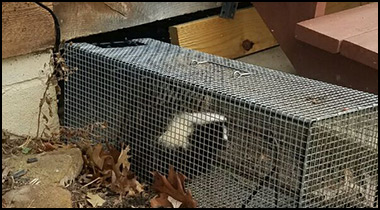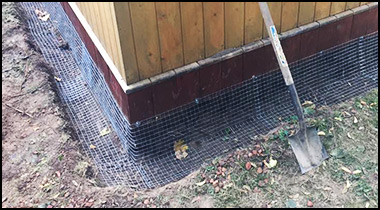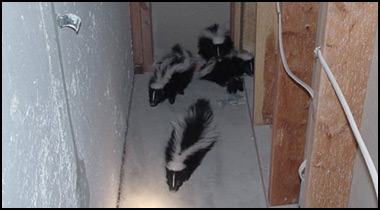Tulsa Skunk Removal Resources
Skunk Rehabber - Foundation for Environment & Wildlife: (918) 688-8337
Free Tulsa County Animal Services: 918-596-8000
Humane Wildlife Trappers of Tulsa: 918-900-6170
If you need skunk control in Tulsa, you have a few options. First, you can attempt to solve the skunk problem yourself by reading our do-it-yourself guide. If you need outside help, you can also call Tulsa County Animal Services to see if they have any free resources or help for you - however, they primarily deal with dog and cat concerns. You can also call a local Tulsa wildlife rehabber, as they are typically a great resource for advice that is in the best welfare of the animal. If as a last resort you must hire a professional company, we recommend Humane Wildlife Trappers of Tulsa at 918-900-6170. To learn more about them or check their skunk removal prices, visit tulsapestanimal.com.

Tulsa Skunk Trapping and Removal

Preventative Repairs & Exclusion

Tulsa Skunk Removal From Structures
In many cases, preventative measures can solve your Tulsa skunk problem - keep garbage secured, pet food indoors, and most of all when it comes to skunks, secure the perimeter of your shed, porch, deck, or house with a barrier - lattice or steel mesh is good, and it keeps Oklahoma skunks from going under the structure. If trapping and removal of the skunk is the only option you have, please do so with the help of a local agency or professional company who knows how to do it humanely and legally. Browse the resources of this site for more educational information.
Frequently Asked Questions:
Prevention: How to Keep Skunks Away
What to do with a skunk after I catch it?
Is it legal for me to trap a skunk?
How to remove skunk odor
Is a skunk active during the daytime rabid?
What does skunk feces look like?
Tulsa Skunk Control Information: What diseases do skunks carry?
Skunks are recognized for their natural coloring and scent; they are beautiful creatures. Nevertheless, more than being white and black or being capable of spraying the horrible scent Skunks are known for carrying some diseases, too. One of disease is rabies which commonly affects dogs, cats, and even human being.
Rabies is a deadly disease that is passed through saliva and spread through bites also sometimes through scratches. The germs go into the bloodstream and then transported to the brain. It causes swelling in the brain, which can lead to additional symptoms.
The other symptoms consist of numbness where you were bitten, seizures, drooling, and muscle function in parts of the body, little fever, muscle tremors, and difficulty swallowing. Therefore Immunization for rabies ought to be given in at least two days of the bite or even scratch.
Leptospirosis is another disease, carried by skunks although it's rare. It is a highly communicable bacteriological disease which can affect dogs, cats, also humans. Symptoms may consist of headaches, fever, stomach pains, nausea, vomiting, and diarrhea, and muscle pain, stiffness, and sore throats, rash. Bites or urine can spread Leptospirosis, in hot or warm areas stagnated water should be avoided.
Skunks also carry Canine hepatitis which is very infectious to dogs. It attacks the liver, kidneys, spleen, and lungs. Symptoms can be different as of a slight fever to fatalness. Young dogs are the most likely to die of canine hepatitis. The greatest common signs of canine hepatitis are a loss of appetite, swelling of the stomach, dehydration, eye and nose discharge, and vomiting. Keep up a strong canine diet is a good way to help avert canine hepatitis.
You should be aware of dealing with skunks since they can transmit canine distemper to domestic animals. Canine distemper causes symptoms such as vomiting and diarrhea along with fever and swelling of the eyes in the animals affected. It usually passes on to other animals that touch the feces or urine of the diseased skunk.
Though skunks can be cute and fascinating little creatures, they can also be hazardous. That why it is important to avoid a skunk that is wandering around in daylight hours, showing aggressive behavior and does not fear humans or animals. It is also advisable for any an animal or person was bitten, to rinse out the wound with soap and water straight away. Also contact the local health specialists and a doctor or veterinarian immediately for any necessary vaccinations or treatments
Remember, for free services you can try (918) 688-8337 or 918-596-8000, but if you need to pay for professional help, check the prices at the tulsapestanimal.com website. Or follow our do-it-yourself guide!

